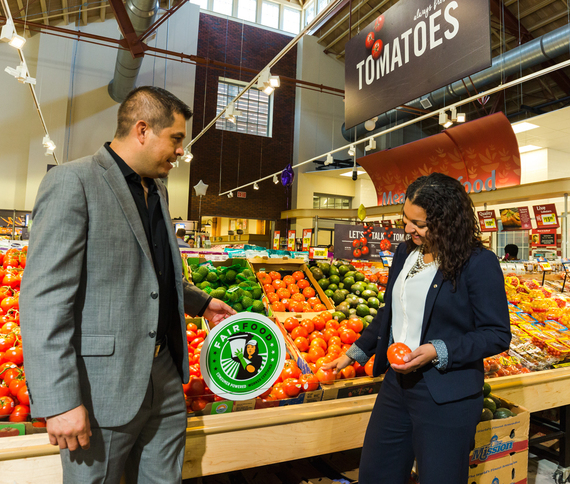Human rights are coming to tomato aisles across the Northeast and Mid-Atlantic. Ahold USA -- the corporation behind such local grocery stores as Stop and Shop, Giant, and Martin's, has become the first major American supermarket to sign onto the Fair Food Program of the Coalition of Immokalee Workers (CIW), bringing higher wages and legally enforced human rights protections to tens of thousands of tomato pickers across the East Coast, from New Jersey to Florida. Ahold's participation in the Fair Food Program will increase the number of grocery stores carrying ethically produced tomatoes by more than 75% and join grocers Walmart and The Fresh Market in extending the human rights protections that first took root in the tomato fields of Florida to participating growers in other states.
This is exciting news for consumers like me, who are committed to asking questions about the human beings behind the food we eat every day. Just this past week, CBS This Morning featured CIW on a segment titled "The Growing Demand for Fair Food," documenting the tangible successes of the Fair Food Program from the perspective of workers, tomato growers, and business. It also highlighted what makes the Fair Food Program stand out from all the other certifications and labels that we see on grocery shelves: the stringent enforcement of the rights enshrined within the Code of Conduct committed to by growers. As Judge Laura Safer Espinoza, who heads the Fair Food Standards Council, quipped "We are enforcement obsessed." That obsession translates into a verifiable seal of approval for those us who know that a commitment to human rights cannot be mere window dressing.
Seen in that light, Ahold's commitment to the human rights of the workers who pick its tomatoes is the critical business response to the poverty and harsh conditions faced by American farmworkers--including wage theft, violence, sexual assault and harassment, and in extreme cases, human trafficking. And those abuses are not limited to the United States. The recently released State Department 2015 Trafficking in Persons Report focused heavily on forced labor in the global supply chains of products we buy every day. The CIW's work was directly cited by the TIP report as a bright spot in an increasingly abusive global market for low-wage migrant workers. Indeed, the Fair Food Program -- which in January was awarded a Presidential Medal for its groundbreaking work in social responsibility -- has been cited by the White House as "one of the most successful and innovative programs" in the world today in the fight to uncover -- and prevent -- modern-day slavery.
Lydia DePhyllis's recent article, "Will there ever be an organics label for worker rights?" correctly suggests that there has not historically been overwhelming consumer demand for products ensuring workers fair treatment and pay. We've seen that shift, however, with a growing demand for Fair Food. Ahold will be proudly displaying the Fair Food label in the produce of their 780 stores because shoppers are, more and more, asking about the stories behind their purchases.
Ultimately, however, the agreement between Ahold and CIW is not a victory because consumers can simply buy a more ethically produced product and feel less overwhelmed in the produce aisles. It is a victory because this affects workers' lives. And it demonstrates how, when the wisdom and expertise of workers is honored at the head of the table, and consumers use public pressure to urge the institutions they patron to heed that expertise, it can result in justice.
Together, our message has been clear: Worker-driven Social Responsibility initiatives like the CIW's Fair Food Program -- unique from the myriad of corporate social responsibility programs, often just window dressing-- are the only way to truly ensure that human rights are protected because they are designed, monitored, and enforced by the very workers whose rights they are intended to protect. That's the only way corporate accountability standards can be rigorously designed, monitored and enforced. By signing onto the Fair Food Program, Ahold USA has signaled that human rights are not just good for business, but are their moral responsibility. It is a message that must be heard by other grocery giants like Kroger and Publix and fast-food holdout Wendy's.
As a rabbi, I believe every human being is sacred, and so I know that it is not the tomato (or the chocolate or the garment) that is created in the image of God, it is the worker, and it is the rights and dignity of that worker that must upheld and protected.
And as a mother, I'm proud to share the news from CIW and Ahold with my young daughters, who have marched with me alongside CIW. This week, farmworker moms are one step closer to being able to return home at the end of the day, as I've heard women in Immokalee put it, "without having to choose between putting food on the table or leaving our dignity in the fields." Every time my daughters and I see the Fair Food label in our neighborhood Stop & Shop store, we'll be reminded of that -- and of the importance for us to keep marching until every farmworker has the same right.
